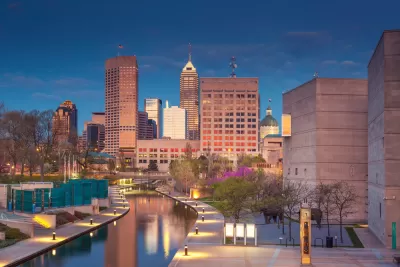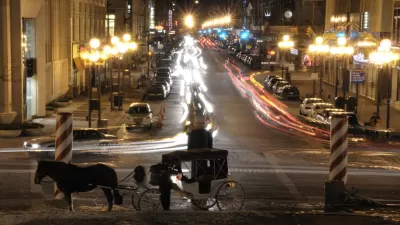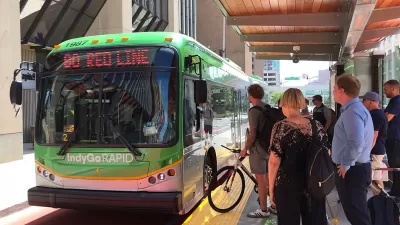It took awhile, but the city of Indianapolis has finally approved the nation's newest income tax to raise revenue for the IndyGo public transit system.

[Updated March 1, 2017] "The Marion County transit system is getting its first major expansion," reports James Briggs.
The City-County Council on Monday approved a 0.25 percent income tax hike that will pump more than $54 million a year into the county's meager bus service. The money will pay for the construction of three bus rapid transit lines, new buses, increased route frequency and new sidewalks and bus shelters.
The transit tax was closely watched by transit advocates around the country, as well as locals, for its unique method of raising revenue and its approval process. Planetizen readers will recall that Marion County voters overwhelmingly supported the income tax for transit, by approving Question 2 in the November 2016 election. The Indianapolis City-County Council delayed action on the results of that vote until yesterday. According to Briggs, the tax took years to approve, moving through layers of bureaucracy at the state and county levels, before finally gaining the approval of the Indianapolis City-County Council.
Now that the whole process is said and done, the income tax hike will take effect in October, explains Briggs, "costing Marion County residents about $100 per $40,000 of income."
[An earlier version of this article incorrectly described the Indianapolis transit tax as the first of its kind. Cincinnati has a 0.3 percent earnings tax that funds transit.]
FULL STORY: Indy council approves transit tax

Study: Maui’s Plan to Convert Vacation Rentals to Long-Term Housing Could Cause Nearly $1 Billion Economic Loss
The plan would reduce visitor accommodation by 25,% resulting in 1,900 jobs lost.

North Texas Transit Leaders Tout Benefits of TOD for Growing Region
At a summit focused on transit-oriented development, policymakers discussed how North Texas’ expanded light rail system can serve as a tool for economic growth.

Using Old Oil and Gas Wells for Green Energy Storage
Penn State researchers have found that repurposing abandoned oil and gas wells for geothermal-assisted compressed-air energy storage can boost efficiency, reduce environmental risks, and support clean energy and job transitions.

Private Donations Propel Early Restoration of Palisades Playground
Los Angeles has secured over $1.3 million in private funding to restore the Pacific Palisades playground months ahead of schedule, creating a modern, accessible space that supports community healing after recent wildfires.

From Blight to Benefit: Early Results From California’s Equitable Cleanup Program
The Equitable Community Revitalization Grant (ECRG) program is reshaping brownfield redevelopment by prioritizing projects in low-income and environmental justice communities, emphasizing equity, transparency, and community benefits.

Planting Relief: Tackling Las Vegas Heat One Tree at a Time
Nevada Plants, a Las Vegas-based nonprofit, is combating the city’s extreme urban heat by giving away trees to residents in underserved neighborhoods, promoting shade, sustainability, and community health.
Urban Design for Planners 1: Software Tools
This six-course series explores essential urban design concepts using open source software and equips planners with the tools they need to participate fully in the urban design process.
Planning for Universal Design
Learn the tools for implementing Universal Design in planning regulations.
Ascent Environmental
Borough of Carlisle
Institute for Housing and Urban Development Studies (IHS)
City of Grandview
Harvard GSD Executive Education
Toledo-Lucas County Plan Commissions
Salt Lake City
NYU Wagner Graduate School of Public Service





























